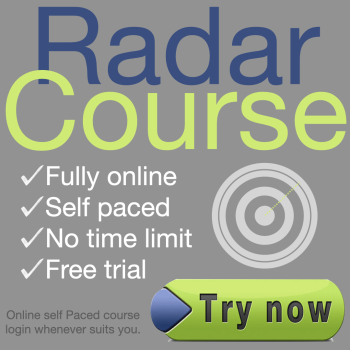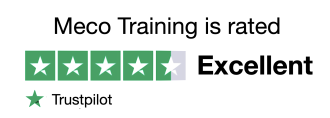Learn how to safely use your boats Radar.
The MECO Online Radar Course
- Fully self paced online Radar course teaches you step by step all the skills and technical knowledge the operator of a small craft (less than 24m) radar needs to know.
- The MECO online Radar course Covers much more than the traditional classroom based radar courses, with a detailed look at the benefits and limitations of cutting edge FMCW Broadband Radar too.
- Learn online how to systematically observe Radar targets, plot, and resolve a Radar target's relative motion into true motion, with step by step lessons throughout the course on each specific element.
- The course contains structured online animations that pin point the key areas of how to maximise all the features of your onboard radar system, highlighting the limitations and dangers of a poorly configured radar.
- The online training material will help with your Interpretation of the rules pertaining to the operation of vessels within restricted visibility, and how to specifically apply these in terms of radar use.
Who's it for?
- Boat & yacht owners
who would like to get the most out of their Radar equipment, or who are considering the addition of a radar system and would like to learn more about the subject online.
- Recreational Yacht Skippers and Crew
who would like to build their Radar skills to deal with restricted visibility, improve situational awareness and incorporate the use of radar into their existing navigational and pilotage skills.
- Trainee skippers
who are training for their RYA or IYT Yachtmaster exams, there will be radar questions during your YM training course and on your exam!
- Commercial Yacht delivery skippers
who would like to ensure their radar knowledge is comprehensive enough to cover the variety of technology they will encounter on the various yachts they sail on, and deal confidently with restricted visibility situations
- Yachtmaster instructors / Cruising instructors
who wish to improve not only their own radar skills but their radar teaching skills too.
- Trainee Cruising Instructors
who would like to ensure they have all the required fully comprehensive knowledge of Radar to deal with any situations, real or otherwise, they may face in this highly challenging course.
Online Radar Course Syllabus
- Radar Ranges (pulsed radar)
- Pulse timings / length
- Pulse repetition frequency
- Pulse repetition Interval
- Range discrimination
- Radar Ranges (Broadband Radar)
- FMCW process
- Bandwidth
- Frequency comparison
- Effective range discrimination
- Limitations
- Radar Bearings
- Horizontal beam width
- Bearing discrimination
- Measuring bearings
- Correcting bearing distortion
- Gain Control
- Signal amplification
- Automation
- Manually adjusting the gain
- The dangers of poorly adjusted gain
- Sea Clutter Control
- Causes of sea clutter
- Signal attenuation process
- How to apply sea clutter control
- Dangers of incorrect use
- Rain Clutter Control
- Types of rain clutter
- Signal attenuation processes
- How to apply Rain clutter control
- Dangers of incorrect use
- Radar Horizon & Range
- Limitations of radars ranges
- Radar Horizon calculations
- Known Target range calculations
- Modes of operation
- Head up mode
- North up mode
- Course up mode
- Hardware requirements for stabilised mode.
- Ranges (pulsed radar)
- Pulse timings / length
- Pulse repetition frequency
- Pulse repetition Interval
- Range discrimination
- Ranges (Broadband Radar)
- FMCW process
- Radar Bandwidth
- Frequency comparison
- Effective range discrimination
- Limitations
- Bearings
- Horizontal beam width
- Bearing discrimination
- Measuring bearings
- Correcting bearing distortion
- Gain Control
- Signal amplification
- Automation
- Manually adjusting the Radar gain
- The dangers of poorly adjusted gain
- Sea Clutter Control
- Causes of sea clutter
- Signal attenuation process
- How to apply sea clutter control
- Dangers of incorrect use
- Rain Clutter Control
- Types of rain clutter
- Signal attenuation processes
- How to apply Rain clutter control
- Dangers of incorrect use
- Radar Horizon & Range
- Limitations of radars ranges
- Horizon calculations
- Known Target range calculations
- Modes of operation
- Head up mode
- North up mode
- Course up mode
- Hardware requirements for stabilised modes
- RACONs
- How the RACON functions
- Limitations of RACONS- all radars
- Limitations of RACONS Broadband radars
- How to read RACON Targets
- Developing technology, E-Racons
- Basic Radar tools
- EBL's
- Ascertain collision risk with EBL
- VRM's
- Radar Cursor
- Radar Plotting Sheet Guide
- How to fill in the information
- How to use the speed-distance-time table
- Radar Plotting Stage 1
- Transferring targets to a paper plotting sheet
- Systematic observation of target
- Plotting the O / A line
- Relative motion
- Plotting relative vectors
- Working out the CPA
- Radar Plotting Stage 2
- Rules of the stationary object
- Understanding of 'Our Motion'
- Plotting the O / W line
- Radar Plotting Stage 3
- Completing the plot
- Plotting a Targets true motion
- Plotting the W / A line
- Measuring targets heading
- Measuring targets speed
- Working out targets aspect at different ranges
- Plotting a true vector
- MARPA
- Correlation of traditional plotting techniques to automated systems
- How to acquire targets
- Reading Relative Vectors
- Reading True Vectors
- Thorough understanding of the difference between RV and TV
- MARPA symbols
- Hardware requirements of MARPA
- Limitations of MARPA
If you're short on time, the course can be completed in around 12 hours total, but it's best to take your time and allow the knowledge from each section to sink in before proceeding onto the next. If you really want to fully understand your on board radar system, this course provides everything you need in a self lead package.



